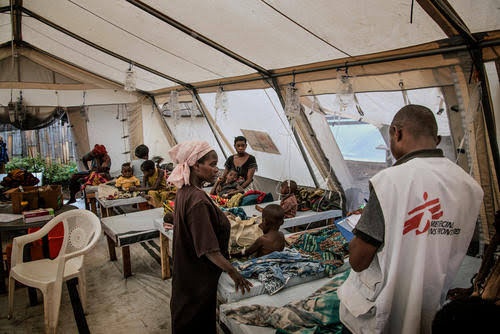MSF Assists To Curb Rapid Spread Of Cholera In Niger Republic
The International NGO is currently scaling medical activities to contain the epidemic in Tahoua, Niamey, and Maradi regions. With 2381 reported cases, Maradi is currently the worst affected region.

The Médecins Sans Frontières/Doctors Without Borders (MSF), an international NGO, has been making efforts to contain the cholera epidemic across four regions in Niger since mid-July.
On Monday, Aug. 9, the Nigerien Ministry of Public Health announced 4283 cases across six of the country’s eight regions and 144 deaths.
The international NGO is currently supporting the Nigerien health authorities with epidemiological surveillance, basic care sanitation, and community education and awareness-raising activities in Tahoua, Niamey, and Maradi; which is currently the worst affected region, with 2381 reported cases.
Souleymane Ba, Emergency Coordinator in Zinder, a region in southern Niger, said they are currently facing a large-scale epidemic due to the rainy season and the risks of the disease spreading are increased as a result of lack of water resources and poor sanitation.
In some regions, he said, cholera cases are decreasing, but more resources are needed to break the transmission chain of the disease in places where the epidemic remains active.
In Zinder region, MSF started its emergency response in mid-July after the first cholera cases were reported in Magaria hospital. MSF scaled up its support after a rapid spread in Tahoua, Niamey, and Maradi regions.
In addition, MSF has set up 15 cholera treatment centres and units, installed oral rehydration points in villages, and supported several local health authorities with logistics and medical supplies. So far, MSF teams have cared for more than 1770 patients.
“The aim of our intervention is to reduce the number of cases and deaths linked to this epidemic by cutting transmission chains through early detection of people who may have contracted cholera, medical care of patients, and awareness-raising among communities regarding surveillance and preventive measures, such as washing hands and food,” Ba explained.
“Cholera spreads through skin, water and food contaminated by the stools of infected people. This is why MSF teams are making an effort to disinfect water points and houses affected by the epidemic. Although the disease can be prevented with an investment in water and sanitation systems, up to 140,000 people die of it every year according to the World Health Organization (WHO).”
With the high cases of districts affected by cholera, he said, “this year, the rapid deployment of material and personnel in response to the epidemic is particularly challenging. This, alongside the malnutrition and malaria peaks, are currently putting Niger’s medical system under a great deal of pressure, in terms of health staff and medical care capacity.”
“The number of patients with cholera cases in the region of Zinder has started to decrease thanks to a quick intervention, medical and community components, which allowed us to contain the number of epidemic clusters. This is the reason why more resources from all the health authority partners must be put in place, in particular to cut the transmission chain within the villages and neighbourhood affected by the disease.”
During an epidemic, Ba said, “the use of vaccinations in the affected areas is a complementary action to the medical treatment, awareness-raising, water, hygiene and sanitation activities to stop the spread of the disease. It is the combination of all the measures that will allow Niger to overcome the epidemic”.
“MSF remains ready to support the Ministry of Public Health with a vaccination campaign in the most affected areas,” he assured.
Support Our Journalism
There are millions of ordinary people affected by conflict in Africa whose stories are missing in the mainstream media. HumAngle is determined to tell those challenging and under-reported stories, hoping that the people impacted by these conflicts will find the safety and security they deserve.
To ensure that we continue to provide public service coverage, we have a small favour to ask you. We want you to be part of our journalistic endeavour by contributing a token to us.
Your donation will further promote a robust, free, and independent media.
Donate HereStay Closer To The Stories That Matter




